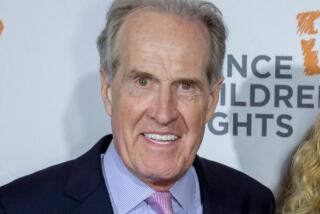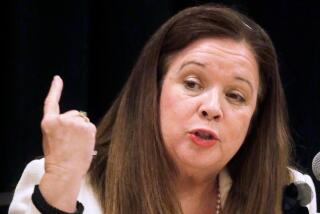Both Sides Make Final Pitch to Jurors in the Dowie Trial
- Share via
Prosecutors charged Friday that Douglas Dowie, a onetime City Hall power broker and public relations executive, masterminded a billing scheme that defrauded city taxpayers and L.A.’s water and power, port and airport operations.
Assistant U.S. Atty. Adam Kamenstein closed Dowie’s conspiracy and fraud proceedings by citing the first day of trial one month ago, when jurors were told that prosecution of the former Fleishman-Hillard Inc. public relations honcho was one of “first-grade morals and third-grade math.”
Dowie’s defense attorney, Nic Hanna, countered that the case was based on “just three scared and very intimidated witnesses who cut a deal with the government, and a handful of e-mails taken out of context.”
“This may be about third-grade math, but this case just doesn’t add up,” Hanna said.
Hanna called Dowie “a hardworking yet demanding boss who cared about his clients, cared about his employees, cared about his reputation in the community, and who had absolutely no motive to commit this crime.”
“Of those 15 [government] witnesses, none -- zero -- testified Douglas Dowie told them to falsify bills,” Hanna told the jury.
Dowie and John Stodder Jr., his assistant, are charged with conspiracy to defraud clients of Fleishman-Hillard, the St. Louis public relations giant that built a big L.A. practice based in part on Dowie’s connections and drive.
The firm admitted to overbilling, and last November completed damage payments to the city totaling $6 million to settle a lawsuit on behalf of taxpayers.
It was a day of high rhetoric in the downtown courtroom of U.S. District Judge Gary A. Feess, with colorful references to bank robbers, restaurant bills and headlines in the sports pages. With testimony over, all that remained was eight hours of closing arguments by the attorneys.
Hanna said a series of e-mails that are the center of the government’s case were all copied to executives of Fleishman-Hillard.
“The people in St. Louis -- they knew all about it. How did Mr. Dowie and Mr. Stodder come to be the lucky ones?” said Stodder’s attorney, Jan Handzlik, demanding to know why “bigwigs” at headquarters were not charged in the billing conspiracy.
Kamenstein and the defense attorneys sparred over two essential elements in the case: whether Dowie and Stodder intended to commit billing fraud, and motive, considered a persuasive factor for juries.
“No motive, plus no intent, equals no crime. That would be my math for this case,” Handzlik argued.
Kamenstein described Dowie as a workaholic dedicated to his career who perhaps wanted to impress his bosses. He also quoted Willie Sutton, who when asked why he robbed banks responded: “That’s where the money is.”
Both sides agreed on one thing: Fleishman’s Los Angeles office was disorganized and the records were in chaos.
“Recklessness, negligence, sloppiness, being a bad manager, making mistakes -- nothing of that equals criminal fraud,” Hanna argued for Dowie. “He’s gotta knowingly and intentionally do it.”
Kamenstein, in his summation, selected several e-mails out of the 1.2 million the government seized, including one in which a Stodder subordinate, commenting on Stodder’s heavy billing, told a co-worker:
“To his credit, he actually made up designations for activities. Maybe that makes him feel better, like they really did happen.”
Kamenstein also cited “the language of conspiracy” in the e-mails, including “get away with,” “slip through,” “boost hours,” and one from Dowie that referred to “padding” bills.
“If you see a lead in the sports pages that reads, ‘Dodgers padded their lead against the Padres,’ does that mean they cheated?” Hanna responded. “No, it means they added to their existing lead.”
Dowie and Stodder have claimed they were not aware of any overbilling schemes.
The Fleishman-Hillard scandal, coming amid other City Hall allegations of campaign finance irregularities and trading of government contracts for political contributions, played a role in the election last year of Antonio Villaraigosa as mayor over incumbent James K. Hahn, a Dowie confidant.
More to Read
Sign up for Essential California
The most important California stories and recommendations in your inbox every morning.
You may occasionally receive promotional content from the Los Angeles Times.













